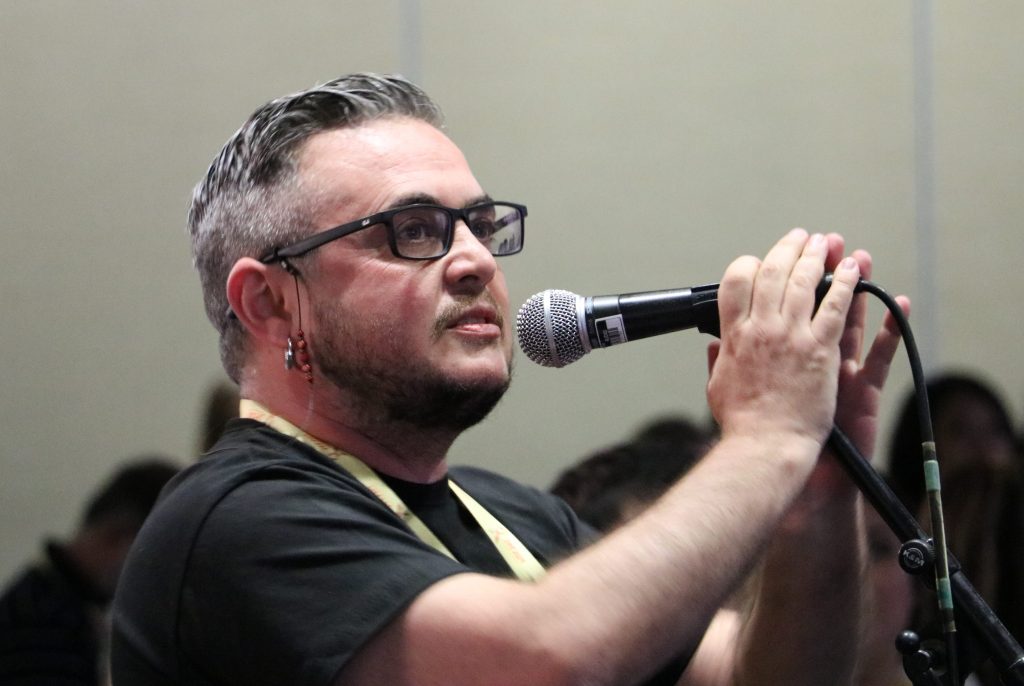At the IAS 2019 Conference, one of the most disingenuous panels was the session titled “Perspectives of transgender women on HIV prevention and care”, featuring the voice of only one trans woman who was invited, not as a professional service deliverer (which she is), but to give her ‘personal story’. During the Q&A at the end of the session, several trans scientists and researchers made interventions, calling out the IAS on their failure, once again, to include trans professionals on panels intended to give a voice to trans communities.
A simple way of defining the word “perspective” is “point of view”. So to host a panel of speakers featuring 3 cisgender women, 2 cisgender men and only 1 transgender woman is in direct contradiction to the title of the panel.
The fact that the only trans woman on the panel was invited, not as a professional service provider to trans communities (she is a psychologist at Neopraxis), but to share her ‘personal experience’, furthered the frustration of the trans people in the audience. To make matters worse, no translation was organized for this session, which was delivered entirely in English, with the exception of Paulina Carrasco-Hernandez, the trans woman, who spoke in Spanish.
For too long, the trans community has been viewed through the cisgender narrative of being eternally victimized and needing to be rescued by a (cisgender) hero. This cis gaze narrative is not unlike the male gaze that women have been subjected to for centuries: one of rescuer and victim. When trans people step out of the role of victimhood, we are, at best, dismissed and ignored, at worst, punished with violence and often murdered for daring to exist outside of this framework.
Many of the issues faced by trans people today are rooted in the pathologization of our communities, first by the medical community, and later by society. Despite the depathologization of trans identities by the World Health Organization (WHO) earlier this year, the scientific community get on board with this view of trans people as human beings, just like any other.
The group of trans professionals, researchers and activists who had showed up in hope that this panel would provide some much-needed research data and service delivery models for trans communities instead found themselves making interventions on the lack of inclusion of trans professionals on the panel.

Topics brought up in the intervention were:
- the issue of representation on stage and why the only trans woman on the panel was not asked to speak in a professional capacity, with the example of the Trans Pre-Conference on “Trans people and HIV”, hosted prior to the IAS 2019 as an example of an entire day in which almost all presenters were trans medical scholars and academics;
- the lack of focus on working conditions as a possible predictor of seropositivity and violence in the research focused on trans sex workers, and the overall exclusion, across the whole conference, of trans men doing sex work (noting that this panel did specify its focus on trans women);
- the lack of translation available for this panel, which was delivered almost entirely in English, which excluded Spanish language speakers’ access to the research, and excluded English language speakers from hearing the only presentation from a trans woman;
- the misgendering of a trans researcher who spoke at the Opening Plenary of the IAS Conference, which spoke to the general erasure of trans men in HIV research globally, both as subjects for research, and as research professionals;
- the question of how many of the researchers on the panel had trans leaders within their teams, not as unpaid ‘community contributors’ but as paid professionals.
The overall response from the panel to the interventions was to make excuses for their inclusion on a panel that clearly states to represent the viewpoints of transgender women. There was some talk about the need to build the capacity of the trans community, with many excuses given about the inability of trans people to lead research, and inaccurate claims that there are no trans medical professionals across the globe working in HIV research, service delivery and care. This was in spite of having been faced with an intervention from 7 trans/non-binary professionals, academics and activists, clearly demonstrating that lack of capacity is not the issue.
It is time for the IAS to step up.
As the world’s largest association of HIV professionals, it is the responsibility of the IAS to call out cisgender HIV professionals on their prejudiced belief that transgender and non-binary HIV professionals do not exist.
Trans people are HIV professionals, scientists, researchers, academics, PhD holders, advocates, activists and, most of all, equal in every way to our cisgender counterparts.
We call on HIV academics and professionals to allow trans people who were part of their research team, to present on the research at conferences.
We call on the IAS to acknowledge this ongoing discrimination within their conferences and to appoint a transgender professional to their planning committee for the San Francisco/Oakland AIDS 2020 Conference and Berlin IAS Conference 2021.





